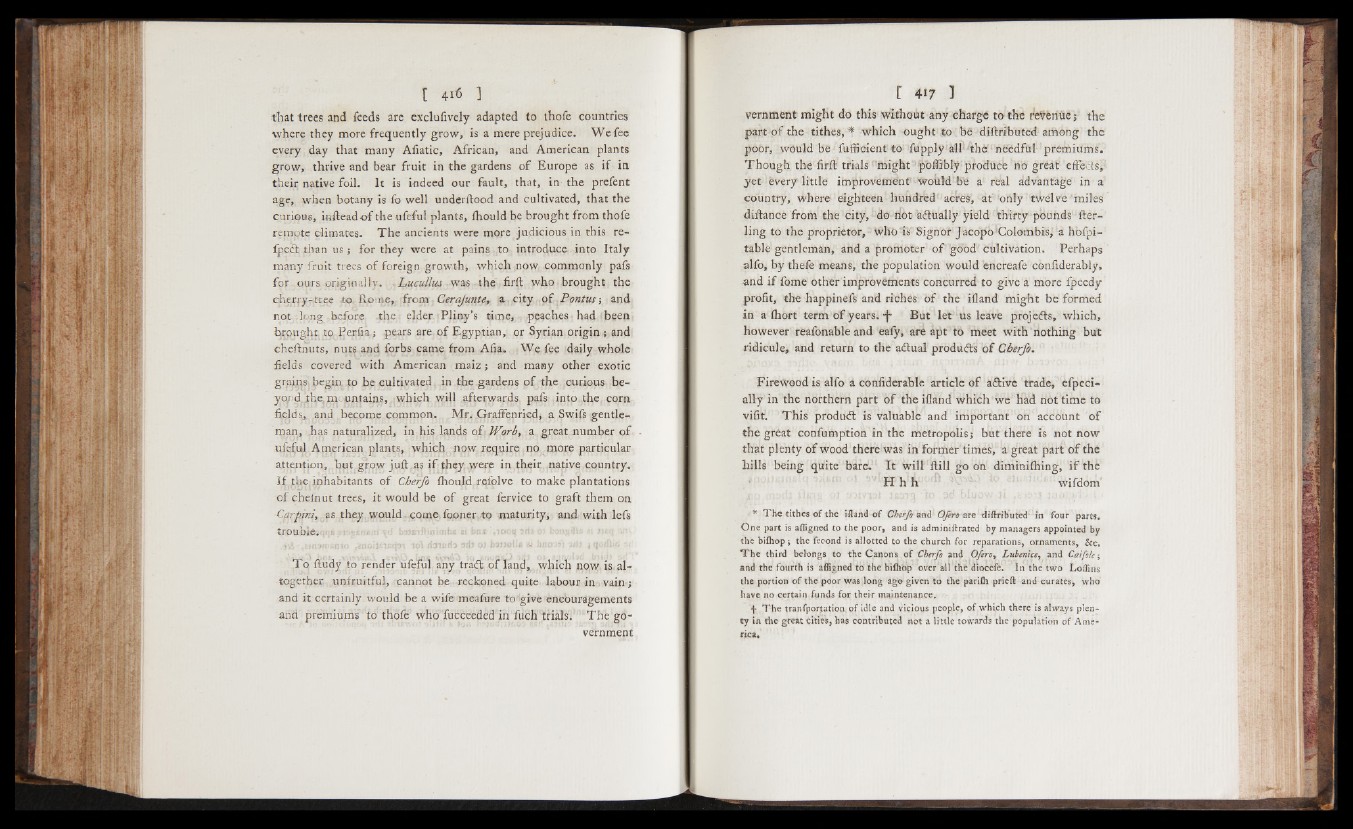
that trees and feeds are exclufively adapted to thofe countries
where they more frequently grow, is a mere prejudice. We fee
every day that many Afiatic, African, and American plants
grow, thrive and bear fruit in the gardens of Europe as i f in
their native foil. It is indeed our fault, that, in the prefent
age, when botany is fo well underilood and cultivated, that the
curious, infteadof theufeful plants, fhouldbe brought from thofe
remote climates. The ancients were more judicious in this re-
fpedl than us ; for they were at pains to introduce into Italy
many fruit trees of foreign growth, which now, commonly pafs
for ours originally. Lucullus was th e . firft who brought the
cherry-tree to Rome, from Cerajunte, a city o f Pontus-, and
not long before the elder Pliny’s time, peaches had been
htpugjjt to Eeiiiia ; pears are of Egyptian, or Syrian origin ; and
cheftnuts, nuts and forbs came from Alia. We fee daily whole
fields covered with American maiz ; and many other exotic
grains begin fo he cultivated in the gardens o f the curious beyond,
ihe.muntains, which wdl afterwards pafs into. the. corn
fields., and become common. Mr. GrafFenried, a Swifs gentleman,
has naturalized, in his lands oiiWorb, a great number of
ufeful American plants, which now require no more particular
attention, but grow ju ft,^3 i f fhey .yvere in their native,country.
I f ¿he, .inhabitants o f Cherfo ihould refolve to make plantations
of chelnut trees, it would be o f great fervice to graft them on
Cpxpini, as they would..come fooner to maturity, and with lefs
trouble. (q**i ■
T o ftii'dy to fender ufeful any tradì of land, which now is. altogether
unfruitful, cannot be reckoned quite labour in , vain ;
and it certainly would be a wife meafure to 'give encouragements
and premiums to thofe who fucceedcd in fuch trials. The government
vernment might do this without any charge to the revenue j the
part o f the tithes,* which ought to be difbibuted among the
poor, would be fufficient to fupply áll'dhé nfeedftxl premiums.
Though the firft trials might poffibly producfe no great effects,'
yet every little improvement Would be a1 rfeial advantage in a
country, where eighteen hundred acres, at' 'only twelve miles
diitance from the city, do riot aftually yield thirty pounds fter-
ling to the proprietor, who is Signor Jacopo'Colombis, a hofpi-
table gentleman, and a promoter of' !gdod' cultivation. Perhaps
alfo, by thefe means, the population would encreafe confiderably,
and i f fome other improvements concurred to give a more Ipeedy
profit, the happinefs and riches o f the ifland might be formed
in a fhort term o f years. J- But let us leave projedls, which,
however reafonable and eafy, are apt to riaeet with 'riothirig but
ridicule, and return to the adtual produfts o f Cberfo.
Firewood is alfo a confiderable article o f adtive trade, efpeci-
ally in the northern part o f the ifland which we had not time to
vifit. This produ<ft is valuable and important on account o f
the great confumption in the metropolis j but there is not now
that plenty o f wood there was in former times, a great part o f the
hills being quite bare. It will flill go on dimmifhing, i f the
H h h wifdom
* Th e tithes of the ifland of Cberjb and Ojiro are diftributed in four parts.-
One part is afligned to the poor, and is adminiftrated by managers appointed by
the bifhop ; the fecond is allotted to the church for reparations, ornaments, &c.
T h e third belongs to the Canons of Cherfo and OJiroy Lubenice, and Caifole;
and the fourth is affigned to the bifhop over all the diocefe. In the two Loilins
the portion of the poor was long ago given to the pariih prieft and curates, who
have no certain funds for their maintenance.
f T h e tranfporttation of idle and vicious people, of whi,ch there is always plenty
in die gteit cities, has contributed not a little towards the population of Amé